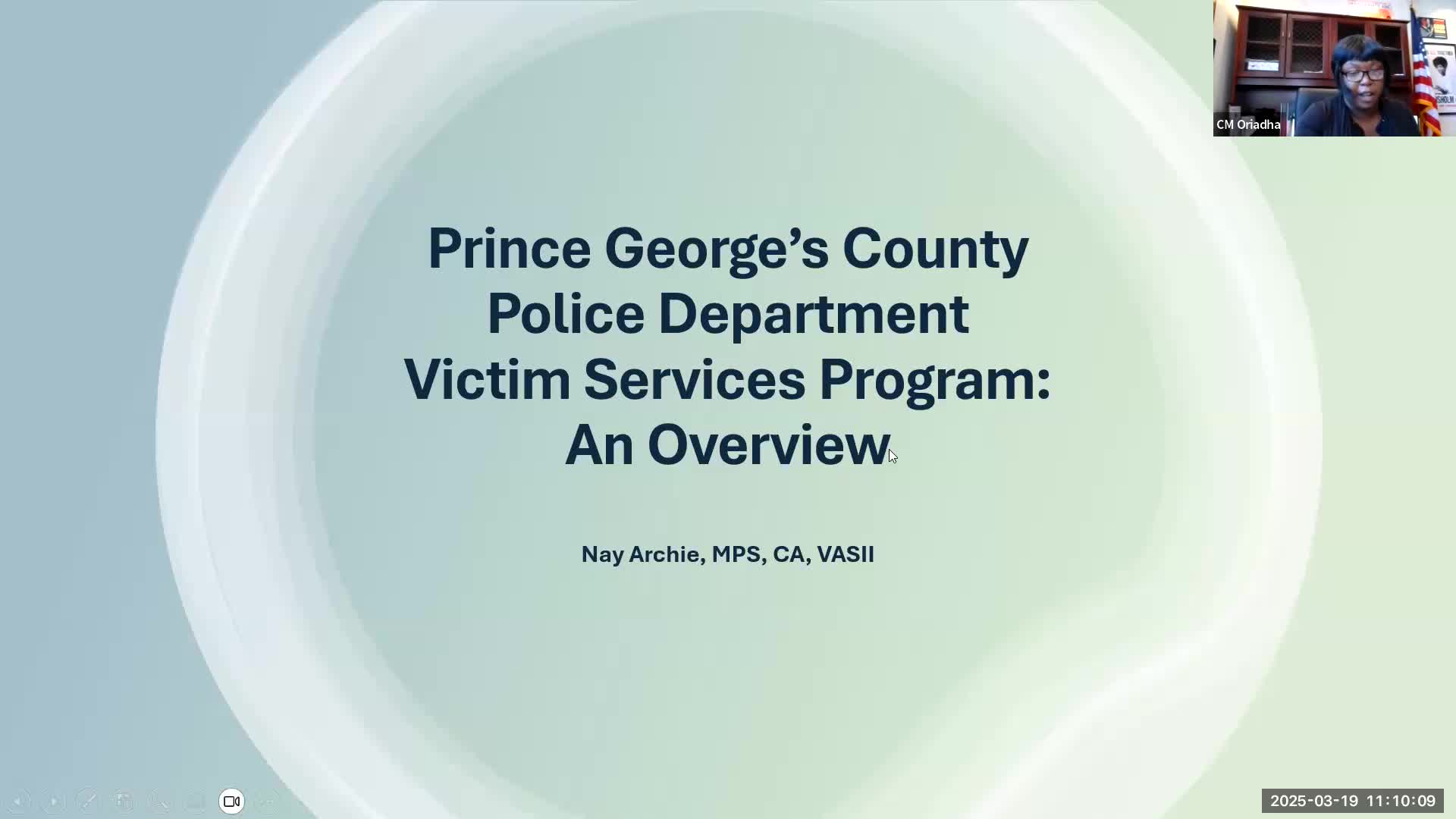Prince George's County workgroup reviews expanded victim services, considers compensation and trauma centers
Get AI-powered insights, summaries, and transcripts
Subscribe
Summary
Prince George's County Council gun violence workgroup members heard a presentation on victim services and discussed a slate of recommendations to expand mental-health care, relocation assistance and community-based trauma support for homicide and gun-violence survivors.
Prince George's County Council gun violence workgroup members heard a presentation on victim services and discussed a slate of recommendations to expand mental-health care, relocation assistance and community-based trauma support for homicide and gun-violence survivors.
The presentation was delivered by Nate Archie, victim services coordinator with the Prince George's County Police Department, who described a reimagined program launched in July 2024 that provides triage, information on victims’ rights and referrals to counseling, legal help and financial supports. "My job is to guide them through the process, explain to them their rights," Archie said, describing outreach that typically begins within 24 hours of notification and remains open as cases move to the state's attorney's office.
The discussion centered on four broad proposals: expanding the statewide victim compensation program to cover mental-health care, relocation expenses and lost wages; creating trauma recovery centers in areas with concentrated gun violence; increasing funding for community-based violence interrupter programs; and strengthening crisis-response teams and free mental-health access for survivors.
Why it matters: workgroup co-chair Council member Oriaga said the proposals aim to reduce the immediate and long-term harms to families affected by lethal and nonlethal violence and to embed services in the community rather than relying solely on episodic hospital or police-based responses. "One homicide from a gun is one too many," Oriaga said.
Program details and partners Nate Archie said the program distributes a homicide brochure to families that outlines what to expect, case contact information and crisis numbers. Archie described partnerships with nonprofit and statewide providers he relies on for counseling and case management, including Community Advocates for Family and Youth (CACHE), the Maryland Crime Victims Resource Center, Roberta's House, My Covenant Place and the Family Justice Center (FJC) located in the Upper Marlboro courthouse. He said many services are delivered in partnership and availability varies by partner and week.
Archie described counseling and support specifics: My Covenant Place provides all services free and by referral; the Maryland Crime Victims Resource Center provides six free therapy sessions with sliding fees thereafter; Roberta's House offers a sliding scale (about $5–$20 per session) and the first sessions free; one local provider charges $30 per individual session and $120 for a family session after initial free sessions. Archie said Roberta's House and Experience Camps run annual bereavement camps in August — Roberta's "Camp Aaron" serves children about ages 6–17 and both camps have wait lists when they reach capacity.
Relocation and immediate needs Archie and other speakers said relocation or short-term hotel stays have been provided on a case-by-case basis when the family is at ongoing risk; the state's attorney's office has funded relocations in some cases. Archie said he coordinates referrals for scene cleanup, funeral and burial assistance and basic necessities when available, and is pursuing grant funding to reduce gaps where sliding fees or post-free-session costs limit continued care.
Coordination and staffing Perry Paylor, deputy state's attorney and co-chair of the workgroup, said the state's attorney's office currently has 16 victim-witness coordinators — seven full-time employees and nine funded by grants — and has operated at a full complement of 22 in the past. Paylor said staffing shortages affect capacity to provide ongoing services. Participants urged the workgroup to inventory coordinators across county agencies, municipalities and nonprofits and to consider bilingual and culturally competent staffing for relocation and casework.
Recommendations and next steps Council members and participants asked staff to catalogue existing funding to partner nonprofits and to identify minimum staffing thresholds for violence-interrupter programs to be effective. No formal votes were taken on policy recommendations during the meeting; the workgroup asked members to add written recommendations to a shared tracking document and said the next meeting will focus on policy options for county and state-level changes.
Votes and formal actions The only formal action recorded in the meeting was the approval of minutes from the Feb. 19 meeting. The workgroup approved the minutes by voice vote with no objections.
What's next The workgroup asked members to continue adding recommendations to the shared tracker and scheduled its next meeting for April 16 to focus on internal and external policy changes, staff coordination and funding options.
Quotes used in this story are taken from the workgroup transcript and attributed to named participants.
